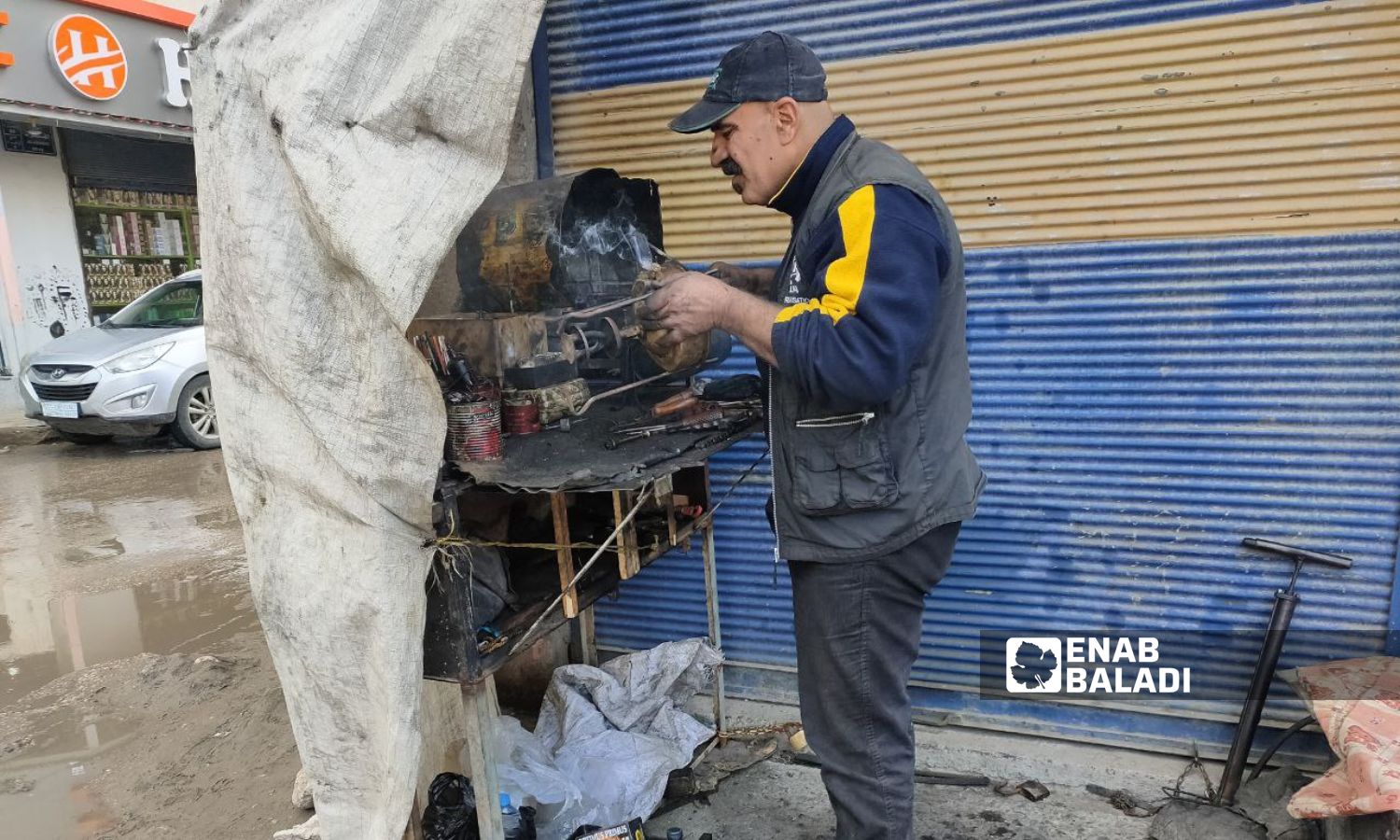



Al-Hasakah – Majd al-Salem
In light of the unprecedented rise in the prices of household gas in al-Hasakah governorate, residents are turning to alternative cooking methods using old techniques that have recently become active and popular, including the kerosene babur stove, despite its dangers and harms.
The prices of a gas cylinder in northeastern Syria, where the Autonomous Administration of North and East Syria (AANES) controls, have risen from 7,500 Syrian pounds to about 150,000 pounds (10 US dollars).
Hajar al-Mahmoud (41 years old) from Qamishli, told Enab Baladi that she is forced to use the kerosene babur after running out of gas from the last cylinder she was using, but she fears using it due to the “many” stories she has heard about women who lost their lives to burns after a “babur” explosion.
As lunchtime approaches, al-Mahmoud places the babur on the balcony of her second-floor apartment, as the black smoke it emits and its loud, annoying sound make it “difficult” for her to use it inside the house, even if the weather is rainy and the climate is “very cold.”
She mentioned that she is fearful when using it, so she prefers that her husband be at home when she is using it in case of any emergency.
The lady added that using babur is tiring and requires extreme caution, and it damages the pots, which need double effort to clean from the soot that stains them black.
On the corners of the streets of Qamishli, several individuals are spread out, practicing the craft of maintaining and repairing heaters and kerosene babur stoves.
Fadel Mohammed (46 years old), a maintenance worker, told Enab Baladi that the number of people wanting to maintain their kerosene heaters increased “significantly” over the past few days, and he mentioned that he used to receive three to four customers daily, while now he receives about 25 customers a day.
He explained that the babur device needs maintenance every few weeks, due to the poor quality of fuel used, which is often adulterated kerosene.
He mentioned that the poor quality of fuel causes clogging of the babur’s ignition head and sometimes damages it, with maintenance fees ranging between 20,000 and 60,000 Syrian pounds when equipping it with a copper head.
The US dollar is trading at 14,650 SYP according to the S-P Today website, which covers the trading rate of the Syrian pound to the dollar. At the start of the conflict in 2011, the dollar was trading at 47 pounds.
Residents of the countryside are considered to be the most frequent users of the kerosene babur, even before the recent gas crisis, due to the lack of services provided in the countryside, especially the provision of fuels and household gas, according to what Enab Baladi observed.
Despite the need for the babur, some people refrain from using it because of its damages and the numerous bad accidents associated with it that are circulated in the countryside.
Fadel al-Hussein (35 years old), from the countryside of al-Jawadiyah town, painfully recalls his wife who he lost about a year ago due to a babur stove explosion.
He said that his wife died and left two children after an explosion of a babur stove due to the use of adulterated fuel, so he refuses to use it no matter what the circumstances.
He mentioned that he prefers to use wood stoves or any other alternative in the countryside, where he resides, noting that the use of the kerosene babur caused tragedies for him and many in the area and left some with burns and scars that accompany them throughout their life.
Maintenance worker Fadel al-Hussein told Enab Baladi that the babur stove can turn into a ticking bomb if it is not maintained regularly because the kerosene used is usually of poor commercial quality.
He continued that some residents handle the babur ignorantly, mixing gasoline with kerosene or diesel, and sometimes they only put gasoline for quality ignition, and gasoline is considered a very dangerous material because it can explode at any time, especially when the temperature of the babur tank, which is close to the ignition head, rises.
According to what Enab Baladi monitored, the price of a liter of kerosene has risen to 6,000 Syrian pounds (previously about 4,000 pounds) with a shortage of the material, forcing residents to buy it from sellers standing at the intersections, which is of unknown origin and usually adulterated.
The prices of babur stoves have risen, with the price of one in the local market ranging between 200,000 and 350,000 Syrian pounds depending on the size, according to Enab Baladi‘s monitoring, and some have been modified, such as moving the fuel tank away from the ignition head using a “hose approximately one meter long,” to prevent heat from reaching the tank and thereby increasing safety.
Some residents have resorted to other alternatives like the laser stove, but the problem of long hours of power cuts and the absence of an ampere subscription to permanently operate them makes it difficult to rely on them, requiring them to return again to using the babur stove.
The use of kerosene babur stoves was not limited to families; some restaurants, especially those selling falafel, fava beans, and hummus, have resorted to using them as an alternative to industrial gas.
The price of a gas cylinder in al-Hasakah has risen from 7,500 pounds to about 150,000 pounds after the recent Turkish strikes in the area, while on the black market, the price has reached about 500,000 pounds, equivalent to half the monthly salary of an Autonomous Administration employee and double the salary of a regime’s government employee.
if you think the article contain wrong information or you have additional details Send Correction